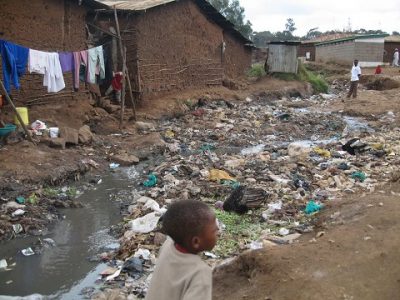By
Joe Khamisi
Kibera, the sprawling slum town on the outskirts of Nairobi, has had the notorious reputation as a crime ridden neighbourhood with one of the highest youth unemployment rates and one of the most decrepit environments in the country.
It has also been known for its nauseating ‘flying toilets’ – perhaps the only invention of its kind in the world – where residents afraid of venturing out at night for fear of attacks, use plastic bags as toilets, which they then fling into the murky Nairobi River.
In my 2011 book, The Politics of Betrayal, in a chapter headed “Kibera Pricks,” I described the slum, situated only ten minutes away from the Central Business District, thus:-
“The sprawling town, which from the air resembles a haphazardly arranged motley of march boxes; and on the ground, a closely knit stockpile of litter, narrow, dark alleys, raw waste and dispirited people, stick out like a sore thumb in a metropolis reputed to be one of the most developed by African standards.”
That was then. Today, the face of Kibera is changing – and changing fast.
The flying toilets are being replaced by new, modern ablution blocks; crime is on the decline thanks to the establishment of police posts; tarmacked roads are replacing dusty/muddy pathways; street lights are being installed; the area is soon to enjoy free Wi-Fi; and thousands of hitherto idle youths are being put to work.
This kind of urban transformation has never been seen before in Kenya. The shanty town of several hundred thousand people is finally coming alive with the help of the revamped Kenya Youth Service..
Last week when the Government released a documentary showing bulldozers and men and women at work, critics dismissed it as a public relations gimmick.
Gimmick or not, the Kibera initiative is receiving so much praise and awe that even the area opposition Member of Parliament, Kenneth Okoth, is now caught in a Catch 22 situation. He cannot decide whether to support the Government unconditionally or stick with the tired ODM line of rubbishing everything the Jubilee government does.
Two things are emerging from this creative initiative.
One, it embarrasses Raila Odinga, the former long-serving area MP who, even as Prime Minister for four years; and with all public resources and influence at his disposal, could not actualise a reconstruction project of this size.
Two, the political benefits of this achievement cannot be underrated. Many Kenyans already believe this could be a game-changer in the politics of the capital city come election time in 2017. At the moment, Uhuru’s TNA controls nine out of the seventeen parliamentary seats in Nairobi, but the situation could change dramatically in his favour three years from now if he replicates the Kibera model in the other ODM-held areas.
Nairobi is the richest and most important constituency in the country. Controlling Nairobi is like controlling Kenya. By doing what Raila failed to do, Uhuru Kenyatta, is proving to the residents of Kibra, who overwhelmingly voted for Raila in 2013, that he is a doer, ready and willing to give them a new lease of life.
It is therefore my view that Kibra cannot and should no longer be considered an opposition stronghold, and Raila should not and cannot expect to receive the fifty-thousand plus votes he got last year come 2017. The windfall will most likely fall at the feet of Uhuru who received only fifteen thousand-plus votes in Kibra during the last general elections.
Former British Prime Minister, Harold Wilson, once said a week is a long time in politics. I say a year and half is a long time in Kenyan politics.
Joe Khamisi
Joe Khamisi is a former journalist, diplomat and Member of Parliament. He is also the Author of the Politics of Betrayal:Diary of a Kenyan Legislator, a political memoir about the situation in Kenya between 2001, when the ruling party of President Daniel Arap Moi, the Kenya African National Union (KANU), merged with Raila Odinga’s National Development Party.
The book also narrates cases of corruption in Parliament and in the Media and records Senator Obama’s visit to Kenya in 2006. As a friend of Barack Obama Senior, the author also remembers the times and tragedies of the American-educated economist.
Joe Khamisi’s second book, a biography, ‘Dash Before Dusk’, has recently been published and is now on sale.





No Comments Yet!
You can be first to comment this post!